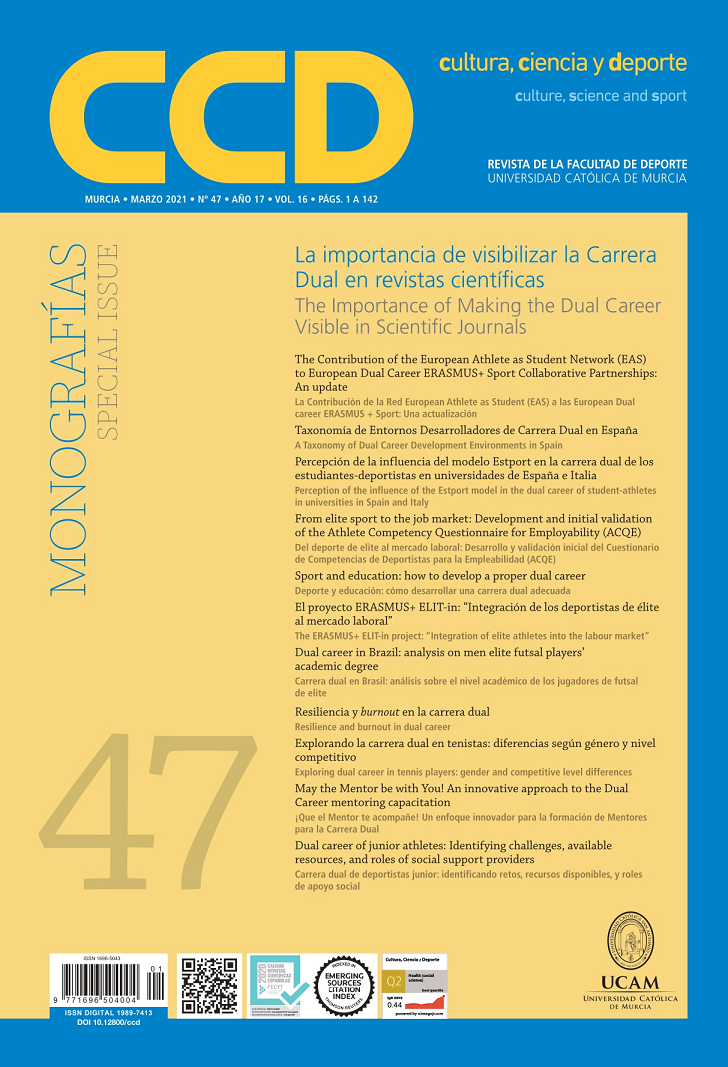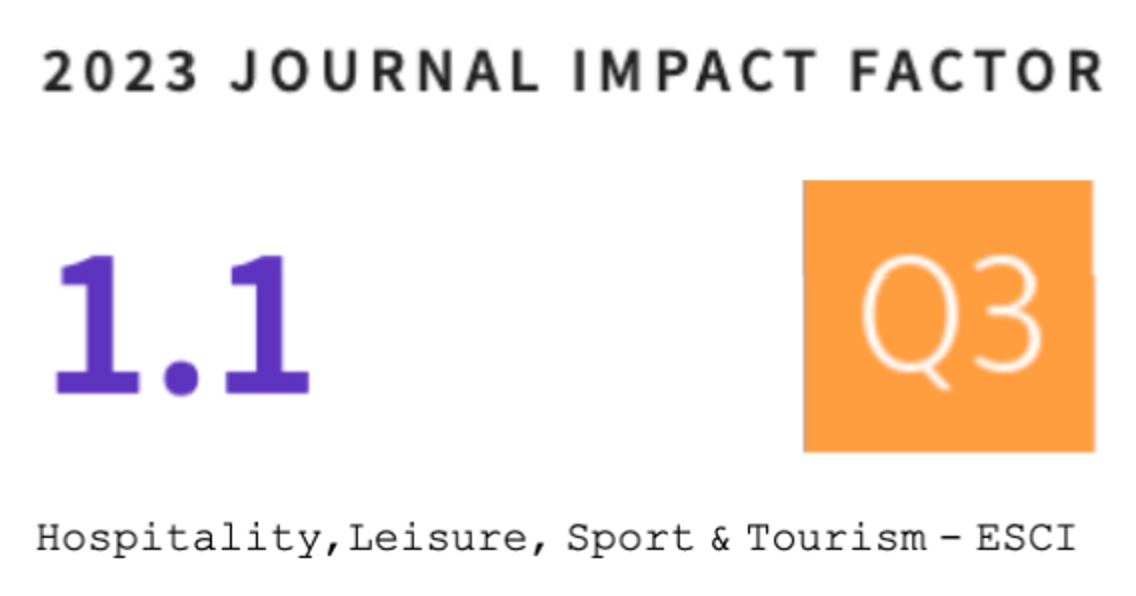May the Mentor be with You! An innovative approach to the Dual Career mentoring capacitation (¡Que el Mentor te acompañe! Un enfoque innovador para la formación de Mentores para la Carrera Dual)
DOI:
https://doi.org/10.12800/ccd.v16i47.1698Palabras clave:
Carrera Dual, Unión Europea, mentoría, estudiante-deportista, deporte, educación (Dual career, European Union, mentoring, student-athletes, sport, education)Resumen
La Comisión Europea ha realizado notables esfuerzos en los últimos años para ayudar a aquellos estudiantes que, dentro del Espacio Europeo de Educación Superior, concilian sus estudios con el deporte de alto rendimiento (estudiantes-deportistas). Para ello, se han desarrollado diversos proyectos que buscan dar respuesta a las
necesidades de este colectivo, siguiendo las recomendaciones establecidas por la propia Comisión Europea. El proyecto YODA Mentors, desarrollado en colaboración de seis países miembros de la Unión Europea, busca la formación de profesionales capaces de cubrir las necesidades especiales que estos estudiantes-deportistas puedan tener a lo largo de su carrera deportiva y académica, Mentores profesionales para la Carrera Dual, capaces de trabajar conjuntamente con instituciones de educación superior e instituciones deportivas a nivel europeo. En este artículo se describen las principales características del programa de formación desarrollado a partir de las recomendaciones establecidas por los comités de expertos de los países participantes, así como la experiencia de los participantes (mentores y aprendices) que están
formando parte del mismo. Se resaltan y discuten las características diferenciales del proyecto YODA Mentors comparándolas con proyectos financiados con anterioridad y que comparten el objetivo de formar profesionales que participen en la Carrera Dual.
===
The European Commission has made notable efforts in recent years to serve those students who, within the European Higher Education Area, combine their studies with performance sport (student-athletes). In this sense, various projects have been developed that seek to meet the needs of this group, following the recommendations established by the European Commission itself. YODA Mentors project, developed in collaboration of six member countries of the European Union, seeks the training of professionals capable of meeting the special needs that these student-athletes may have throughout their sports and academic careers, professional Mentors for the Dual Career, able to work together with higher education and sports institutions at European level. This work describes the main characteristics of the training program developed based on the recommendations established by the expert committees of the participating countries, as well as the experience of the participants (mentors and mentees) who are being part of it. The differential characteristics of the YODA Mentors project are highlighted and discussed, compared to previously financed projects with the same objective of training professionals involved in the Dual Career.
Citas
Allegre, C., Berlinguer, L., Blackstone, T., & Rüttgers, J. (1998) Sorbonne Joint Declaration. Retrieved from http://ehea.info/page-ministerial-declarations-and-communiques
Álvarez, P. R., & López, D. (2012). Armonización entre procesos de aprendizaje y práctica deportiva en universitarios deportistas de alto nivel. Cultura, Ciencia y Deporte, 21(7), 201-212. doi:10.12800/ccd.v7i21.85
Brackenridge, C. (2004). Women and children first? Child abuse and child protection in sport. Sport in Society, 7(3), 322- 337.
Chambers, F. (2018). Learning to mentor in sports coaching: A design thinking approach. London: Routledge.
Conzelmann, A., & Nagel, S. (2003). Professional careers of the German Olympic athletes. International Review for the Sociology of Sport, 38(3), 259- 280.
Cushion, C.J., Armour, K.M., & Jones. R.L., (2003). Coach education and continuing professional development: Experience and learning to coach. Quest 55: 215–30.
Disability Rights Commission (2006) Disability equality duty. Disability Rights Commission. http://www.dotheduty.org/
Eby, L.T., and Lockwood, A. (2005) Protégés’ and mentors’ reactions to participating in formal mentoring programmes: A qualitative investigation. Journal of Vocational Behaviour 67(3), 441–58.
European Commission (2007). White Paper on Sport. Brussels: Directorate General for Education and Culture.
European Commission (2012). EU guidelines on Dual Careers of athletes: Recommended policy actions in support of DCs in high-performance sport. Retrieved from http://ec.europa.eu/sport/library/documents/DC-guidelines-final_en.pdf
European Commission (2013). Green light for the Erasmus+: More than 4 million to get EU grants for skills and employability. Retrieved from https://ec.europa.eu/commission/presscorner/detail/en/IP_13_1110
European Commission (2013). Erasmus+ Programme Guide. https://ec.europa.eu/programmes/erasmus-plus/sites/erasmusplus2/files/files/resources/2014-erasmus-plus-programme-guide_en.pdf
European Ministers in charge of Higher Education (1999) The bologna Declaration of 19 June 1999. Retrieved from http://ehea.info/page-ministerial-declarations-and-communiques
European Union (2018) The EU in support of the Bologna process. Retrieved from https://op.europa.eu/en/publication-detail/-/publication/e437d57d-5e32-11e8-ab9c-01aa75ed71a1
Fairhurst, K. E., Bloom, G. A., & Harvey, W. J. (2017). The learning and mentoring experiences of Paralympic coaches. Disability and Health Journal, 10(2), 240–246.
Fletcher, S. (2000). Mentoring in schools: A handbook of good practice. London: Kogan Page.
Gibson, S.K. (2004). Mentoring in business and industry: The need for a phenomenological perspective. Mentoring and Tutoring, 12(2), 259– 75.
Puig, N., & Vilanova, A. (2006). Deportistas olímpicos y estrategias de inserción laboral. Propuesta teórica, método y avance de resultados. Revista internacional de Sociología, 64(44), 63-83.
Sánchez- Pato, A., Calderón, A., Arias-Estero, J. L., García, J. A., Bada, J., Meroño, L., ... & Mallia, O. (2016). Diseño y validación del cuestionario de percepción de los estudiantes universitarios-deportistas de alto nivel sobre la carrera dual (ESTPORT). Cultura, Ciencia y Deporte, 11(32), 127-147.
Sánchez, A., García, J. A., & Rosique, P. (2018). Modelo de carrera dual para el deportista-estudiante. En A. Sánchez, E. Isidori, J. L. Arias-Estero, & Bada, J. D. (Coords.), Modelo de carrera dual universitario. El caso de los deportistas-estudiantes. Cendea de Cizur: Aranzadi.
Sánchez-Pato, A., Isidori, E., Calderón, A., & Brunton, J. (2017). An innovative European sports tutorship model of the Dual Career of student-athletes. Guadalupe: UCAM.
Torregrosa, M., Ramis, Y., Pallarés, S., Azócar, F., & Selva, C. (2015). Olympic athletes back to retirement: A qualitative longitudinal study. Psychology of Sport and Exercise, 21, 50–56. https://doi.org/10.1016/j.psychsport.2015.03.003
Torregrossa, M., Regüela, S., & Mateos, M. (2020). Career assistance programs. In D. Hackfort & R. J. Schinke (Eds.), The Routledge international encyclopedia of sport and exercise psychology. London: Routledge.
United Nations (2006). Convention on Rights of People with Disabilities.
Wylleman, P., Alfermann, D., & Lavallee, D. (2004). Career transitions in sport: European perspectives. Psychology of Sport & Exercise, 5(1), 7- 20.
Young, J.R., R.V. Bullough Jr., R.J. Draper, L.K. Smith, & L.B. Erickson. (2005). Novice teacher growth and personal models of mentoring: Choosing compassion over inquiry. Mentoring and Tutoring: Partnership in Learning, 13(2), 169–188.
Descargas
Publicado
Cómo citar
Número
Sección
Licencia
Los autores que publican en esta revista están de acuerdo con los siguientes términos:- Los autores conservan los derechos de autor y garantizan a la revista el derecho de ser la primera publicación del trabajo al igual que licenciado bajo una Creative Commons Attribution License que permite a otros compartir el trabajo con un reconocimiento de la autoría del trabajo y la publicación inicial en esta revista.














